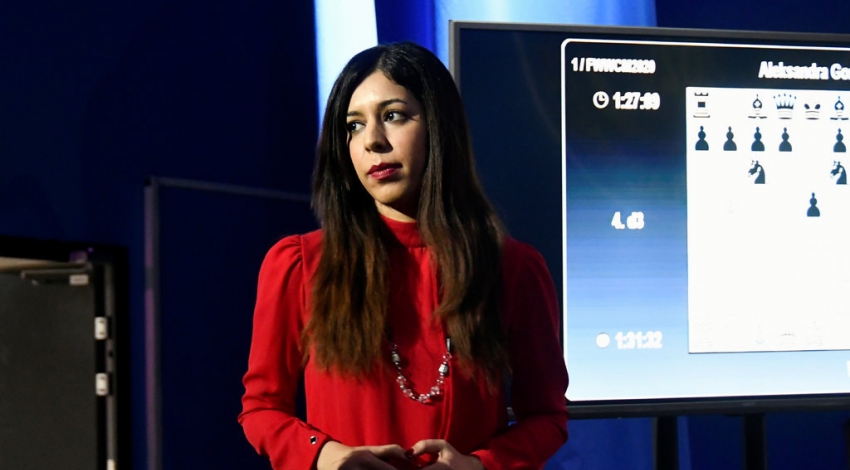The Iranian chess official said she began seeing the messages of support from American government officials soon after she said she was afraid of returning to her country.
An image of the official, Shohreh Bayat, appearing not to wear a hijab at a world chess tournament in China had circulated online and in Iranian media and she quickly went public with her fears that she would be arrested if she returned to Iran. It is against Iranian law for a woman to appear in public without a head scarf.
No wonder Shohreh Bayat is afraid of returning to #Iran, the United States Embassy in Lisbon said on Twitter on Jan. 24, about a week after her story began appearing in news outlets around the world. Since the 1979 Islamic Revolution, women risk harsh prison sentences for violating the mandatory hijab law.
Similar messages on the Twitter accounts of American embassies in Armenia and Madrid and the United States Consulate in Barcelona appeared around the same time.
Ms. Bayat, 32, a high-level chess referee, said on Friday she was grateful but also confused.
It does seem a little ironic to outwardly support individual Iranians while simultaneously barring their entry to the country, she said in an email.
Iran is one of five Muslim-majority countries that face restrictions under a policy enacted in 2017 by the Trump administration, which argued that those countries needed to satisfy security requirements for travel into the United States.
The administration has said the countries, which also include Yemen, Syria, Libya and Somalia, had failed to thoroughly assess the security threat of citizens traveling into the United States.
On Friday, the administration added six countries to the list of nations facing stringent travel restrictions, including Myanmar, where the Muslim minority is fleeing genocide.
Aaron Testa, a spokesman for the State Department, declined to say whether the tweets about Ms. Bayat signaled a change in how the administration viewed cases like hers and other Iranians who could be considered dissidents in their country.
We cannot speculate on whether someone may or may not be eligible for a visa, Mr. Testa said. Whenever an individual applies for a U.S. visa, a consular officer reviews the facts of the case and determines whether the applicant is eligible for that visa based on U.S. law.
Ms. Bayat was in Shanghai on Jan. 8 presiding over a chess match during the Womens World Chess Championship, which began in China and concluded in Russia.
During a break, she turned on her phone and saw a picture of herself at the tournament circulating on Iranian media, which is heavily monitored by the government. The picture appeared to show her without the hijab, and Ms. Bayat said Iranian media were accusing her of flouting Iranian law.
[caption id="" align="alignnone" width="758"]
 Ms. Bayat at the Womens World Chess Championship in Shanghai, China, in January.Credit...Lewis Liu/Fide, via Lewis Liu, via Fide, via Reuters[/caption]
Ms. Bayat at the Womens World Chess Championship in Shanghai, China, in January.Credit...Lewis Liu/Fide, via Lewis Liu, via Fide, via Reuters[/caption]Ms. Bayat said she was wearing the scarf but it had slipped to the back of her head and the angle of the photograph made it appear as if her entire head was uncovered.
At first, I was deeply shocked and panicked, she said. If I could be condemned on Iranian media, with false motives ascribed to me, on the basis of a deceptive photo, without anyone from Iran having even contacted me, then the stark implications of returning home were clear.
She decided that day to stop wearing the hijab, which she said she never wore willingly. Ms. Bayat said she was soon getting supportive messages from around the world, including the American embassies.
Ms. Bayat asked to be interviewed by The New York Times by email because she wanted to answer questions carefully and make sure my answers wont cause a problem for me or my family.
The tweets from the embassies also linked to an article about Ms. Bayat on ShareAmerica, a website run by the State Department that describes itself as a platform for communicating American foreign policy worldwide.
The article described how Iranian women continue to strive for equality and noted the case of Kimia Alizadeh, an Olympic bronze medal winner who recently announced she was defecting from Iran.
The tweets underscore the hypocrisy of the Trump administration when it comes to Iran, said Mariko Hirose, litigation director of the International Refugee Assistance Project in New York.
She noted how the Trump administration verbally supported Iranian Christians, who face discrimination and persecution in Iran, but declined to allow many of them entry into the United States.
Now, while the American embassies express support for a woman fearing return to Iran, the president has doubled down on a ban that has for three years blocked Iranian families from reuniting with their loved ones in the United States, Ms. Hirose said.
Ms. Bayat is in London where she is trying to sort out her options. She declined to say whether she is seeking asylum.
But she said she would not ask for permission to come to the United States, primarily because she is ineligible under the current restrictions.
I had a U.K. visa so I came to the U.K., which is a lovely country, Ms. Bayat said.
She added that most chess events held by the International Chess Federation are in Europe.
She remains in contact with her husband and parents in Iran.
For some time they were so emotional that it was even difficult for them to talk to me, but now they are recovering, Ms. Bayat said. It is extremely difficult to be far from my family, but I am doing my best to stay strong.











